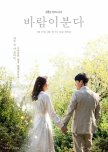
Years after the “Yes”-word, and yet a substantial love story, touching without being kitschy
"The Wind Blows" sounds quite inconspicuous, but it is not. It turns out to be a moving love story. Actually it is rom+/-com that starts exactly where other love stories end: with the ´yes´ word. The KDrama tells of what can happen when the butterflies (in the face of the new) are followed by ordinary years of shared, sometimes painful everyday life relationship... But that's not why love has to be gone missing. On the contrary... yet eventually, love might find it harder to take its space...The title "The Wind Blows" refers specifically to the moment when the two protagonists first met many years ago. At that time the wind was blowing. What started then is not over yet. Figuratively, the wind is still blowing. However, the everyday challenges of aging have now added to their married life. The two must meet those challenges. It is rather common that one may be tempted here and there to make solitary decisions instead of communicating. One may have doubts if there still can be a way together. Every now and then it seems that such a common path is not (or no longer) possible. And then, maybe, one or the other might open up again.
"The Wind Blows" tells a serious and profound story about a love relationship that has grown out of the first romantic phases. Generally, this is less wanted on screen, as it inevitabely comes with problems, arguments and breakups. (Somehow that's in the nature of relationship - the constant rubbing against each other in a wide variety of ways actually leads to feeling/sensing yourself and the other person in the first place... it doesn't work without it. Does it?) In this KDrama, problems, arguments and breakups are all in, too. But so is love. (...as so often, although we might fail to notice in the midst of turmoil.)
I don't want to hide the fact that Alzheimer's disease is involved here as a stab in the back and at the same time a second chance. Against this background, the story manages to tell sensitively, empathetically and at times ruthlessly about the bumpy stretches of a patient love that has been and remains there over time - even if it is experienced differently over the course of the years, perhaps sometimes cannot be shared and also has changed its forms of expression over time.
The sensitive processing and the emotionally intense acting (great: Kam Woo-sung and Kim Ha-neul) are KDrama quality at its finest, which has once again proven itself to be just perfect for dealing with such a complex subject, which is difficult in several respects. A substantial story, touching without being kitschy.
(Well, I didn´t need the slightly shallow subplot and few unnecessarily humorous sequences here and there. Yet they obviously tried to loosen things up... well...)
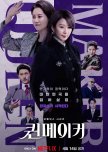
Sisterhood in a man´s world. Let yourself get both annoyed & inspired by politics behind the scenes
What a wonderful power show inside out politics. Yes, it's ugly and you might want to smash right into it. Often enough and plentifully. But it also has its heart in the right place. Repeatedly. Dealing with politics may make you doubt the meaning and purpose of democracy. But it doesn't get any better without those intrepid heroes willing to stand up for a better world. One may sometimes lose faith in something like a democratic gene in people. But one can always hope and fear. The game is only over when it is over. The election is not over until the votes have all been counted.Stupendous women. On both sides of the front. And the men? Oh well. So and so. (And if many people complain about Lee Geung-young because of his scandal, he at least prefers to choose the role of the challenging guy, where one can wholeheartedly consider him disgusting...)
Well, I consider the sisterhood thing being the crucial message for me in this story. Yes, there are strong, competent women, who, against better female instincts, cling to old structures and customs - in the wake of the Jaebeol clan. Yet there are those competent, motivated, witty, loyal to higher ideals women, too, who are sharing those ideals with others and walking side by side. Even if tempted and seduced they still sense what is right and wrong and act on that when in doubt. Using and abusing (interchangeable lackeys) for personal gain vs. appreciation and recognition (of brothers and sisters) are very sensitively compared here as common HR strategies and management styles.
With 11 episodes (only), Netflix slips through the story fairly quickly - only the most necessary input about the protagonists are given. However, especially the actresses don't let the story rush past you. Kudos to (in this case in particular) the heart and soul of the Ahjummas and a storytelling that, while strikingly handling the political landscape for its stringency, nevertheless spreads the complex mixture of motives, hopes and fears in a well-sorted manner.
Does the end justify the means? This age-old question apparently never ages. "Queenmaker" makes you think, but also often leaves you terribly annoyed about the way things are. The KDrama makes you angry, demoralizes, and yet: at the same time it gives hope. Strong women, a strong story, an often enough an ugly world in which, however, once again each individual contributes to the fact that it could be one way or another...
Obviously I would recommend it - if you´re in the mood for something like that. And: obviously there are no Idols and no Love Story involved. People may die, but it is no crime story. It isn´t funny, either. Nevertheless, I would say, you should check it out and let yourself get both annoyed and inspired by politics behind the scenes.
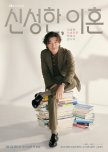
The story being told in an unagitated & well-rounded way unfolds its unique (I´d say: high) quality
"Divorce Attorney Shin" is actually based on the webtoon of the same name by Kang Tae-kyung. The KDrama comes with the handwriting of the same screenwriter as i.e. "Thirty Nine", "Always" and "Encounter" – Yoo Young-ah. In the case of "Divorce Attorney Shin" once again shows off her strengths: drawing true-to-life, sensitive portraits of friendship and relationship dynamics with plenty of ordinary life of ordinary people. In "Divorce Attorney Shin" you get (also thanks to marvelous actors/actresses!!) authentic, lifelike characters and circumstances. In this case with sometimes maybe a bit weird, but loving details. With characterful esprit. Unagitated. At times a joy to the heart. Almost soul food."Divorce Attorney Shin" tells stories from the red-hot everyday life of many people in South Korea, which is increasingly about divorce. The number of divorces in the country is currently going through the roof. The topic becomes almost normal madness. KDrama understands this just as such. Divorce is normal. Not nice. Not desirable. Not originally intended. But often unavoidable as the next step. And sometimes maybe...
(A bit tongue-in-cheek: the title. Attorney Shin's name "Shin Seong-han" literally means "sacred" in Korean. Thus, his name tag "Shin Seong-han, Divorce" becomes a provocative play on words. Attorney Shin is also the man for the cases when the ´holy state of marriage´ has faltered...)
There are many reasons and circumstances behind such a momentous decision as divorce ( ... and it may always accompanied by a bit of shame and feeling of failure, which needs to be digested emotionally). Some of them come along enrobed in different cases. They are weaving their way around the frame of the story, the main focus of which are three old friends – above all, however, divorce lawyer Shin Sung-han. One of the recurring scenes is the small but finely drawn retro lawyer's office with a wooden sliding door that sometimes gets stuck, which you quickly grow fond of. Also, Shin's apartment with retro-style hi-fi, where he spends his evenings listening to loud Trot music, preferably singing and drinking soju from a wine glass. And then the cozy Ramyeon restaurant around the corner from the office. Added to this is the special relationship between Shin and a client who ultimately joins the team and another young lawyer, who somehow stumbles over Shins piano skills into the office. And then there's his own past as a gifted pianist and the reason why he's no longer one.
Kudos to the layered nuances that paint the complex environment in which divorce tends to be embedded. No divorce is like the other. But most of the time, divorce hurts or hurt started before and therefore led to it. "Divorce Attorney Shin" touches on a multifaceted assortment of backgrounds and triggers over the course of 12 episodes short-term critical circumstances and long-term effects, emotional suffering and opportunities, economic chains and hopes, social stigmas and societal prejudices, and then, too, self-doubt, as well as collateral damage and sacrifice. It's not always just 'the others' who are affected, but the controversial issue of divorce is getting very close to almost all of the protagonists. JTBC attacks a hot social topic with the KDrama.
"Divorce Attorney Shin" offers all this embedded in a variation of slice-of-life. Leisurely, cozy and enjoyable – and therefore digestible. But it's not at all harmless. There is plenty of law-and-order with a comprehensive arc of suspense. On the one hand, this is the professional talent of our protagonist – although not his only one. On the other hand, there is his own family history, marked by the pain of separation and divorce, which is unexpectedly stimulated anew. The dramaturgical dynamic of the story is increasingly gaining momentum and ultimately steers inevitably towards Shin's very personal showdown, where justice is fought – not with firearms or fists, but according to the law, with evidence and with a sense of proportion, heart and mind.
In my opinion, the story finds an extremely fine nuance on all levels, which shows an ever deeper effect over time. Subtle but lasting. I would associate (not timbal, but) Koshi chimes – depending on topic and episode, sometimes more in the timbre of Aqua, sometimes more in the timbre of Aria, sometimes more in the timbre of Ignis, and sometimes more in the timbre of Terra... The story being told in a coherent and well-rounded way unfolds its very unique (I´d say: high) quality.
-----------------------------------------------------------------------------------
SIDE NOTE: --- Trot ---
KPop is a 2000ff phenomenon in Korean music history and by now even most non-KDrama fans are familiar with it. ´Trot´ however probably is less known. But beware: maybe in the not too distant future there will also be a KTrot, who knows...
'Trot' dominated the Korean music scene – as the earliest form of popular music in the peninsula. Trot is less well known to the rest of the world, but has experienced an enormous revival in its own country in recent years, which is now taking the genre even beyond national borders, too. "Divorce Attorney Shin" presents one of the hits, which was released brand new in 2020 on the CD "9 Stories" by Trot old master Na Hoon-a. The 72-year-old landed a megahit, with its YouTube video being viewed 25 million times and thus temporarily relegating the superstars BTS and Blackprint to their places. Korean cultural export strategists are smart and quick. The song promptly finds its well-staged place in the appropriate KDrama with "Divorce Attorney Shin", which also takes the direct route to the international audience via the Netflix streaming platform…
'Trot' grew on Korean soil and is quite retro in its foxtrot and slowtrot beat derived from standard dance. 'Trot' goes back to the time during the Japanese colonial period and the import of the 'enka', mixed at that time with the folksy, epic pansori lamentations (at least for me often reminiscent of flamenco), as well as the traditional aesthetically harmonious, lyric poem form Siga. However, due to its entangled roots with the Japanese 'enka', 'Trot' fell under censorship from the 1960s onward and only resurfaced in the 1980s. However there was also J-pop , hip hop and rap allowed to reach the masses and with that influence the then upcoming new and hip KPop pushed 'Trot' into the background.
Only now, when KPop is firmly established, does interest and space for something 'new', identity-establishing traditional obviously open up again. There may be something old-fashioned about ´Trot´, since young people are more familiar with it via their grandparents generation. However, the music triggers a nationally rooted, melodramatic emotionality... It's quite possible that a contemporary, new variation of internationally hip KTrot will develop over the course of the next few years. At least the trot is rediscovered – not first – but also by "Divorce Attorney Shin"...
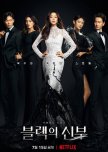
Ready-made. Still worth seeing. Social satire about status & by all means climbing up social ranking
"Remarriage and Desires" tackles a central theme of South Korean social life: who should I, can I, must I or do I want to marry? Marriage, family and status throughout the centuries have been forming a magical triad in this Confucian shaped country - a triad which can decide how happy or unhappy life will become... Yet, these days within the framework of the short-timed everyday life and performance-oriented professional life in modern South Korea there is simply no time for naturally meeting someone and dating. However, the right choice is crucial. So instead of spending time, you spend money and thus can be matched up professionally. This actually has a good tradition in elite circles, where matchmakers were already in high demand during past Joseon days. Arranged marriages - whether devised by shamans, personal matchmakers, professional matchmaking agencies or parents - are widespread today and have recently become trendy even among the less elite classes of society. ... As a good choice can decide everything..."Remarriage and Desires" takes this subject into the grotesque - in a satirical guise with a proper breeze of Makjang. A stately squad of spiteful, greedy contemporaries at the highest ranks are brought together to tell a bitter tale of revenge on revenge on revenge. The bad news first: the Netflix production unfortunately does not get beyond a script that has been polished for the international streaming audience and that also seems to be off the shelf. The good news: KDrama is even good at telling such ready-made stories, too. By the way, it's the intensity of the female leads who are allowed to rock the makjang-show: Bad, worse, the worst... and there still is worse (The men rather become victims and ornaments.)
My criticism: Scheme-F. Ready-made.
The heartbeat get´s lost. The depth is missing. It's not really possible to develop an emotional closeness to the protagonists. Overall, "Remarriage and Desires" thus comes across as somewhat distant and stiff in comparison. As a spectator you will feel less sympathy (from the inside) and instead watch more (from the outside).
You might binge through the (only) 8 episodes pretty quickly. But without the nuances, something is missing. For me at least. I didn´t feel an emotional bonding growing of any sort. Too bad.
However! the KDrama is still worth seeing as a satirical social study about the South Korean middle and upper class (or a general would-like-to-marry-into-the-still-higher-class class).
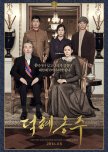
It is heavy opera. Nothing light-weight about it. And a rather outrageous (national) affront, too
"The Last Princess" is about Princess Deokhye, the youngest daughter of the 26th and last King Gojong of the Joseon Dynasty. The (sad) story is told in haunting images.
----------------------- SIDE NOTE: --- Historical context of Princess Deokhye ---
Under pressure from Japan, in 1907 the King had to abdicate in favor of prince Sunjong. Princess Deokhye herself wasn´t born at that time, but five years later, in 1912. The former king was then already 60-year-old. Being the daughter of his concubine, Deokhye initially received no official status as a princess. Yet she was very much loved by her father. However, the still young princess had to leave her parents and country at the age of 13 and grew up as a hostage in Japanese exile...
---------------------------------------
In taking on the princess´ story, the KMovie is simultaneously portraing a truly gloomy chapter in Korean history. Thus the movie itself makes you feel not only sad but even angry at times. One could say, the plot is about ´makjang´, written by history itself.
Although the historical facts are mixed up with a bit of poetic freedom, this (in my opinion) doesn't detract from the authentic circumstances of the Korean people being oppressed by the Japanese at that time. The producers of the KMovie have been accused of portraying the princess (despite her mental instability) in an overly sympathetic attitude towards the Resistance. Additionally her supposed engagement obviously was fictionally romanticized and falsified for the smoothness of the plot - on the other hand historiography doesn't know everything and why not fill the gaps with life by your own imagination und thus get a lively look&feel of almost forgotten times...
In any case, via the horrified eyes of the princess you will experience what colonialization might have felt like. There is plenty of heart and soul, as Son Ye-jin splendidly brings the tragedy of the princess back to life - with all her traumatization by the numerous personal blows of fate and forced by the historical circumstances of her time. Eventually, the movie brings this traumatic past vividly back to memory for those who experienced it themselves, and closer into the consciousness of today's society as well.
In short: It is heavy opera. Nothing light-weight about it. Nowhere. It is confronting the audience with a rather outrageous national affront. The movie want´s you to make a stand. And it actually succeeds in emotionally catching your compassion.
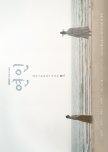
Ambitious & powerful historical epic done with perfection - right down to the supporting roles
Wow! Historical epic. Visually stunning. Magnificent. What starts out harmless is caught up in the merciless story. Please buckle up. "My Dearest" goes all out. Thrilling! Moving! Intoxicating.The excursion leads into a painful chapter of Joseon's past, its historical cornerstones being emotionally successfully captured in striking scenes. Already after the third episode one may have forgotten the harmlessly rocking swings... back when everything was right with the world. On the other hand, the worst at times brings out the best in people. This may certainly be true for our protagonists, because the more hopeless the circumstances, the more persistent their personal commitment.
A dramatic story. A moving love story. An excellent historical drama. Definitely worth seeing. The time around the Qing invasion on the Joseon Peninsula will remain unforgettable for everyone... and the epic relationship of our protagonists too!
What a couple - in the course of their encounters, Namgoong Min and Ahn Eun-jin develop a strong, charismatic attraction for their ambivalent and baffling, yet complex and nuanced characters. All this is visually perfectly staged. Perfection applies overall to the dramaturgical layout of the intertwined personal and political processes. "My Dearest" offers differentiated, touching character portraits right down to the supporting roles. Powerful!
Unfortunately, after the tenth episode, we're stuck for a while before we continue with the second season... But until then, as far as I am concerned, "My Dearest" has been a complete success!
-----------------------------------------------------------------------
SIDE NOTE --- the Qing invasion 1636 ---
The historical context of “My Dearest” is quite an issue for Joseon history! For the Korean national self-image the impact of the Qing invasion of 1636 can be reckoned even more traumatic, shameful and dramatic than the unparalleled Japanese invasions of the Imjin Wars in 1592 and 1598. This is because Joseon finally had to ignominiously submit to the Qing and eventually remained their vassal state until the First Sino-Japanese War end of the 19th century. (With Imjin Wars, Joseon was actually able to repel their invaders - at that time with the help of the Ming - and thus could preserve the grandeur of sovereignty.) That second Qing invasion in 1636 went down in history as a truly disastrous defeat. Who likes to remember such a 'weak' king and such unspeakably embarrassing humiliation?
Apart from its touching epic love story, "My Dearest" thus also deals with the narrative of the people of Joseon back in the 17th century - their different positions, either pragmatic or idealistic. That time of the invasion is well documented in diaries of contemporary witnesses. Historical scholars to date, however, have discussed the Qing invasions in Joseon mostly from the perspective of the Qing against the Ming and the political power struggles concerning the Chinese empire. In “My Dearest” the Joseon perspective is given its own emotional narrative. And this is characterized by personalities, ideals, value systems, symbolic gestures, as well as those small and large deeds and sacrifices of inconspicuous people who often fall through the cracks of historiography. So "My Dearest" isn't just heartfelt entertainment. To a certain extent, the KDrama has an identity-forming, great mission and takes it very seriously and right into mass consciousness. Its intention is to be suitably great. It offers portraits of the people at that time an how they were processing historically questionable/questioned decisions, too. It brings us close to the dilemma of that time. And greatly so.
-------------------------------------------------------------------------
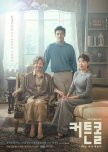
The plot has enormous potential, yet more bite and sting really wouldn't have hurt.
The share of Makjang in South Korea's series productions seems to decrease noticeably. After 3 seasons of "The Penthouse" in 2021, taking the evil within the "´War of Life´ to the extreme, it might have been somewhat exhausted? Thus, "Curtain Call" may be a noticeably 'softened' Makjang series (if at all). In this manner however, the KDrama represents a social zeitgeist that should not be underestimated: the desire for reconciliation. Reconciliation with the North. Reconciliation between generations, between the past and today. Reconciliation between duty and dream. The search, the longing, the need for South Korean society to balance itself on a new level - finding peace. To me, that's what "Curtain Call" stands for.As so often, the focus is on the rich and beautiful. In this family clan, too, the third generation could disassemble itself in the fight for the golden spoon. But somehow things are a bit different here than otherwise in KDrama Orbit.
The head of the family is (quite progressively) a woman. Matriarchy instead of patriarchy, that makes a difference. While she probably represents business acumen and a strong leadership style, for all the respect she receives, she has NOT sacrificed her heart for her grandchildren and employees on the track. Also: For once, she (at least she) does NOT embody the incarnation of disparaging arrogance. She is NOT someone who mercilessly pursues her own interests without regard for human losses. In the contrary, there is a healthy dose of humility, because even in old age she is still close to the very simple roots of her origins. This is also because her homeland is in what is now North Korea. She remains aware of the painful separation throughout her successful life. No amount of money can turn back time or realign the political structures. Like that, she embodies a vicarious pain shared by many family histories across the country. And so an emotional bridge is practically built to the audience - ´halmoni´ gets some sympathy.
The plot has actually enormous potential: the grandson from North Korea, for whom the now old and terminally ill chair(wo)man longs in her last remaining weeks and months, was actually found. However, his personality seemingly doesn't lend itself to a peaceful happy ending - and so an actor who is versed in the North Korean dialect is introduced into the family as a fake grandson instead. He does his job so well that he ends up doubting his own identity...
"Curtain Call" manages to play out some of its punchlines in an emotional sensitive way. Nevertheless, the story remains more harmless than necessary and the potential isn´t realized. The KDrama doesn't take its chances, instead prefers to choose warm colors and soft images. All in all, "Curtain Call" might find its own pitch in the KDrama orbit, yet it keeps a low profile along the way and unfortunately does not take the next step. It rather remains kind-hearted and thus gambles away a dramaturgical chance. In my opinion, more STING really wouldn't have hurt. Too bad.
Nevertheless: "Curtain Call" is nice to watch. The cast is top notch. In places razor-sharp and at the same time pointedly funny, the KDrama also operates (especially against the background of the North-South dynamic) in a good mood with small socio-critical side swipes here, there and over there as well. The dialogues exploit this potential with relish. The bottom line is that "Curtain Call" is probably worth seeing if you DON´T feel like too much excitement, revenge, action, thriller, legal affairs or romance.
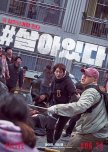
In the first half, the KMovie is actually a one-man show. And that, I think, is the strongest part
"#Alive" is a variety on hip zombie stories. First things first: it doesn't have much new to offer in this respect - zombies as a plague that spreads fear and terror, a horde that you want to shake off or destroy, like disgusting, annoying vermin. Well, that's not why I would recommend this KMovie.I also don't think that you have to overstrain the reference to the Covid pandemic and the sometimes grueling current lockdown experiences that come with it.
Even fans of the horror genre won't be really happy with "#Alive", because "horrifying" can surely be done even better.
So why am I mentioning the KMovie here? The script revolves around surviving in an almost hopeless situation. However, the focus is not mainly on the action, but rather on the quiet moments in which the protagonist is ruthlessly thrown back on himself. There he is alone with himself and his inability, facing his insufficient survival skills, his loneliness and hopelessness ... and finally the desire to leave this world.
Oh Joon-woo isn't a born hero - perhaps he was trying to be in the day-long, night-long computer games, with his joystick in hand. But then the Internet connection is gone, no water supply, no food, no one can be reached. The self-chosen isolation in his room with his virtual game world, which has shaped him to this day, is one thing. Real isolation with real threats and no virtual team is something completely different. It's about that juxtaposition and the painful process of waking up to a NOW that's so different from the gaming world. Ultimately, the impulse comes from outside, which helps him to venture out of his safe cocoon into the real and thus truely threatening world.
However, the movie isn´t anti-technology. On the contrary, in playful creativity technical gimmicks, old and new, give the story new impetus again and again.
In the first half, the KMovie is actually a one-man show. And that, I think, is the strongest part. It's never boring. Actor Yoo Ah-in once again uses the chance to show what he's made of. In this way, the viewers accompany him through his very personal Hall of Pain, and there he hardly omits any physical form of expression. For this he has meanwhile been awarded the Cine 21 Award for best actor. After almost half the distance he gets support from Park Shin-hye, who embodies a character who pursues a completely different survival strategy - namely, she has one, even if she also reaches her limits with it. As is well known, more than one person form a group and a group develops its own dynamics, which can do more than each individual on their own. Here too. Both of them grow together. Heroes are rarely born as such...
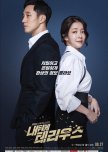
With "My Secret, Terrius" the KDrama-World shows what it can do, too: simply entertain.
"Terius Behind Me" playfully and lightheartedly balances between RomCom and spy thriller. The series dates back to 2018, but in view of the global corona pandemic, it is probably more up-to-date than intended. That makes the spy story a bit very serious in retrospect. Otherwise, "My Secret, Terrius" is a bit funny - the investigations and relationship dynamics intertwine in capricious ways. It's a bit cute - with the two twins as well as a second "romance" in the subplot. A bit tart - the legendary star spy undercover as an inexperienced babysitter for two bright six-year-olds. Between the two main leads, it's actually a bit about romance, too. But there is also room for a bit of bromance - male friendships. And there is a little something in it for handbag freaks.An exclusive highlight in "Terius Behind Me", however, is the Korean style neighborhood watch - the distinctive esprit of the mothers' association of the Kingsman neighborhood, that is characterized by notorious curiosity (by the way, a man is part of that, too). As the Kingsman Information System (KIS), they prove to be several times superior to the National Intelligence Service (NIS) - especially in terms of efficiency when it comes to their high-tech networking and highly motivated investigations.
In passing, you also gather some impressions of life in typical high-rise condominiums in Seoul´s new development areas, the over-committed mothers in such neighborhoods, and (in case I didn´t already mention it before)... handbags... :-)
With "My Secret, Terrius" the KDrama shows what it can do, too: simply entertain.
Enjoy.
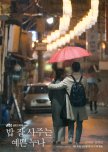
Down to earth romance, providing troubling insight on what South Korean women are facing these days
"Something in the Rain" is a love story about an older woman (35) with a younger man (about 27/28). Yet, above all, the KDrama is a critical social study about relationship taboos and parental respect in South Korea as well as sexism in the workplace. Authentic. Bitter. Sweet.The original title of the KDrama "Pretty Nuna, who invites me to dinner" contains the taboo relationship with all its dynamics on which the story is based - the woman is older (´nuna´) than her boy friend (a no-go!)..., and still being a sucessful employee she earns good money instead of being married (another no-go). Actually in South Korea this is a serious problem of a recent generation gap and gender conflict.
Just consider the significance of "Something in the Rain" (as the romance that it is) in such a broader sense. If you are missing a special icing throughout the story, than this is simply what it is. It is supposed to. Overall, I consider "Something in the Rain" a rather up to date, down to earth, authentic romance, providing troubling insight what kind of circumstances South Korean women (and men) are facing these days.
--------------------- SIDE NOTE --- South Korean women and romance in everyday day life
In relation to everyday life in South Korea the focus on romance and true love in KDrama takes on a whole new meaning. Very few people really have time for a relationship during their professional life. The working days are long. In addition, women are discriminated against at work, sexualized and reduced to their gender role. They work harder (and often more efficiently) than their male counterparts, but are paid less and are less likely to be promoted, as they are bound to get pregnant soon. If they really do get pregnant, then that's it for professional life. Child care for 70-80 workhour weeks (with commuting and company dinners) is hardly affordable. Women do not have to hope for flexible working hours from their employer. So women with children inevitably end up at the stove. Women can forget about returning to work.
As a daughter, women already have a difficult time in the family. If they are married, then first of all they have to relieve the elders - in both families. (If they are not married, they are blamed or rushed oder pushed to quickly do so). Men, on the other hand, are celebrated by families as sons from the start. Accordingly, they present themselves in public with self-confidence and appear more macho. It's not uncommon for them to loudly and rudely gossip about the looks of women in the coffee shop or restaurant or shop or at work or in public. (Actually with the job market being extremely competitive, the appearance of women can not only decide about the partner, but also about the employment).
There are numbers from surveys showing that on average, seven out of ten South Koreans don't have time to date and only about four out of ten are in a committed relationship. The work is more important. Not necessarily because they identify with it so much, but because they don't want to lose it. The pressure to perform is enormous for everyone. As a result, 3/4 of South Korean women between the ages of 25 and 29 are not yet married. Among women between the ages of 30 and 34, more than half are still unmarried. South Korean women also have increasingly modern demands for a self-determined life. They are less and less interested in macho men and suffocating family structures that reduce them to rasing children, representation and the home. This is also due to the fact that normal households can hardly cover their expenses. Family costs money. Divorce rates are rising (South Korea is having one of the highest in the world), yet women are finding it difficult to return to work. There is also a stigma to living as a single parent. (Accordingly, these days not only unmarried couples, but also married couples are less likely to have children.)
Society is in a dilemma. In fact, it can't help but modernize its patriarchal, women-discriminating value systems if it wants to survive. The South Korean population will otherwise shrink under the given circumstances from 2027 onwards. (Update 30.7.22: Statistics Korea reports on 28. July 2022 first time shrinking in 2021 already...)
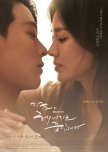
Jang Kiyong unconvincing as creative, Paris-based, free-spirited, rebellious, footloose photographer
"Now, We are Breaking Up" tries to tell a love story in reverse (e.g. it has been there already). This would be an interesting project in itself, yet...The plot is emotionally quite complex, the characters are in principle jucily interesting and ambivalent. If a KDrama can't take care of a multi-layered, complex mixture of feelings, then who can? Unfortunately, I have to say that (in my opinion) this project doesn't really work out so well with the casting.
Regarding her emotional intensity, Song Hye-kyeo is (as so often) a major factor for watching. As the heroine, here and there her reservedness, sobered by life, is perhaps a bit much. But in places this cracks open. It is this well dosed mixture and subtleness, that makes her role convincing - the experienced fashion designer in her late 30s has turned away from flirtation and rather concentrates on her work, into which she throws herself completely. Being the talented and experienced professional she is, hardly does she ever get upset by anything. ... until her encounter with the young photographer Yoon Jae-gook, that throws her (emotional) life (supposedly) upside down. Her reservedness so far operated as shelter and imprisonment at the same time. Circumstances don't really offer a chance to free herself from the corset of reason, which is protecting her deeply injured heart - never mind let herself fall and trust emotionally. This inner dynamic is not so nice to look at - or rather endure - for the viewers. But I don't think you can blame Song Hye-kyeo, as she handles this inner tension and the ambivalent moments of her complex role very well.
On the other hand (unfortunately) I don´t buy Jang Ki-yong in his role as a creative, Paris-based, free-spirited, a bit rebellious, footloose, and at the same time successful photographer. For me he behaves way too reserved, well adjusted, well-behaved - a sympathetic, dear, rich, successful boy. So unfortunately, HIS ambivalence doesn't convince me. Perhaps actor Jang Ki-yong lacks the life experience (on the rebellious side)? And since he can´t really fill this side with life, I am not convinced by the chemistry between the two leads. It doesn't get to me how the young man in his supposedly fiery manner, would be able to reignite on an EMOTIONAL level the fire of lust for life and joie de vivre (beyond work) that is still blazing somewhere deep down in Ha Yeong-eun... So the key to all further makjang doesn't really fit into the lock. Too bad. Thus the experiment of telling love in reverse didn't really work out that well.
The KDrama is not bad because of that (...though admittedly disappointing ...). On the pro side: There are freshening subplots, each with actors in good humour, who have actually won awards for their spirited performances. The setting in the creative industries is kind of charming, too. Finally, the Korean family values are (once again, but successfully as always) playing with fire on the drama front...
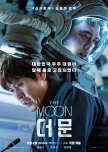
Filming standard à la Hollywood meets melodramatic narrative, emotionally firmly rooted in SK soil
“The Moon” could have easily been titled “The Dark Side of the Moon”. At least we as audience learn quite something about it... But it's actually about much more. The KMovie is delivering action within the high-tech world of space travel. On top of that it is touching, thought-provoking and thus gnawing at fundamental, existential and political questions, too. We get a remarkably balanced production between ´international´ filming standards à la Hollywood and a melodramatic narrative with its emotional roots firmly planted in South Korean soil. So eventually, this lunar expedition is neither/nor, as this KMovie offers something in between. For hard-core fans of Hollywood blockbusters it might be offering too much melodrama. For the hard-core KMovie fan it might not be enough. Well, I simply enjoyed it as the lunar expedition as it is.The focus is on the ambitious national program that South Korea has recently set up in terms of space research (you may check side note below). With its technological innovations, South Korea is starting to present itself as an increasingly self-confident G7 space power. That is where this story is coming from. And it is against this background that the particularly high level of filmmaking effort must be seen, by which the experience of space is brought almost hyper-real within the audience's grasp.
The special ambience is staged first-class thanks to the applied highly developed audiovisual filming technology and expertise. Seemingly, the production team has spared no effort or expense - with 3D rig camera recordings, premium HDR video technology, Dolby Cinema technology (for the first time in a KMovie), innovative spatial audio technology and sophisticated rendering processes for the finest color nuances. The demand was for high-end cinema quality. And it is surely impressive. Everything in this distant, highly technological, alien world, far way within the orbit of the moon, comes as close to the audience as it can get.
Despite the enormous spatial distance, dense emotional intensity is provided, even though the protagonists are located so far away from each other. This delicate emotional bridging, requiring high-end performance skills, has been the big challenge on the actors´ side. In addition to the proven, first-class veterans Sol Kyung-gu and Kim Hee-ae on the ground at the rather clinically clean setting with high-tech computers and screens of both Aerospace Centres Naro and NASA, especially Doh Kyung-soo (D.O.) offered magnificent top performance as an astronaut lost in space. Mainly those three create and maintain an impressively emotional density (in addition to the overall action).
The plot of "The Moon" revolves around South Korea´s international profile as capable space power, while the eyes of the world are set on their (fictive) second trial of a manned lunar mission. Whereas unfortunately it didn't work out the first time... It's also about politics and tons of money. And in the end, it's all about survival... or rather, whether a human's life in the face of groundbreaking missions for humankind is worth ignoring chains of command, nationalities and costs.
Breathless action on unusual terrain. Intense scenes in an isolated space capsule 380,000 km away from earth, surrounded by darkness and severe cold. Desperate helplessness. The struggle for the 'right' decision – what´s actually the measure of what is right? Maybe ultimately just what I can live with in the end?
----------------------------------------------------------------
SIDE NOTE: --- KSpace ---
Korean movie oder drama productions set in space have so far been few, and for good reason. The KMovie “The Moon” from 2023 as well as i.e. the KDramas “The Silent Sea” (from 2021) and “Ask the Stars” (planned for 2023) are, so to speak, a start. They reflect current (or better: hoped for further) developments regarding KSpace.
After rather unsuccessful endeavors at the beginning of the new millennium, South Korea as the 13th country to have its own space center by now, is increasingly well positioned in the KSpace segment. 2021 was marking the first attempt to launch their own test satellites into the orbit by their launch vehicle Nuri, which had been developed over the past ten years. Yet it failed. Nevertheless, in 2022 and 2023 it succeeded at last. Three more Nuri launch vehicles are already scheduled to be launched into orbit by 2027. According to the plans of the country and the Korea Aerospace Research Institut (KARI) at Naro space center, South Korean spacecraft will be collecting data on the moon in 2032 already. Additionally, the country has Mars scheduled for 2045.
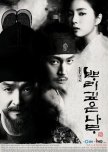
A vividly told emotional story about the creation of Hangul and its impact. Absorbing. Gripping.
Of course, this historical drama is (as many others) full of intrigues, power struggles and revenge. But King Sejong, the 4th Joseon king, who is the historical subject of this KDrama, was indeed a bright shining star in the Joseon sky. So is this KDrama.King Sejong created the Korean alphabet. Not just him alone. But this great achievement goes back to his driving force and his vision of a mature people. The story impressively tells of the bumpy road to Hangul. It also tells of how important it is as an identity-creating medium for self-confident citizens. Previously, Hanja - the canon of sheer countless characters of Chinese origin - was the country's binding writing. Not only that, but a whole range of Korean words are loanwords of Chinese origin - to this day. At the same time, this reflects the asymmetrical balance of power between the Korean dynasties and the Chinese dynasties. The use of the Han signs not only symbolizes the hierarchy among the peoples, but also within one's own people. Scribes and scholars were needed, who had the muse and time to learn these characters (more than 100,000 in total). Thus, they had the authority to interpret. It was hardly possible for ordinary people to learn. A scripture that connotes words and meanings in characters is based on a completely different concept than a scripture composed of a compact alphabet. Based on the phonetics of the Korean language, King Sejong developed an alphabet finally consisting of 14 symbols for consonants and 10 for vowels. The writing system to apply those in a way to form words and sentences can be learned comparatively quickly, even by ordinary people. What a progressive concept at the time! What a threat to the elite of scholars and noblemen!
The title "Deep Rooted Tree" refers to verses from the 'Songs of the Dragons That Fly to the Sky' - the Yongbieocheonga. This contemporary document about the Joseon Dynasty and its legacy was the first book that was ALSO written in the new Hangul writing system.
"Deep Rooted Tree" is (among many other truly exciting dramatic events throughout the story) about the impact of scripture for the people of Joseon - a story vividly told in an absorbing manner. A truly fantastic presentation. With gripping protagonists. Multidimensional. With high emotional impact.
The dramaturgical setting introduces the king (from the perspective of the male protagonist) as the bad guy. But the 24 episodes (analogous to the alphabet?) provide an impressive insight into the fascinating life´s work of that great king - embedded in the excitingly increasing momentum of the vendetta of a boy from humble origins who grows up to become an outstanding warrior and finally ends up as royal guard.
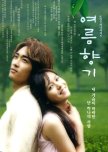
It´s comparably less makjang, but more morals – and Schubert's Serenade, again and again
"Summer Scent" is one of those early classical KDramas, marking the emergence of the South Korean TVdrama genre as an export hit with all its quality features. In the early 2000s the Hallyu, the Korean Wave started creating a stir, first in Asia and at last throughout the rest of the world.Typically, the narration is so richly peppered with sometimes malicious, sometimes tragic twists - ´makjang´ at its best - that for some the emotionalism might be almost unbearable, if you are not ready open up for the deepest dramas of heart and soul. KDrama is in that context also a master of nasty, often enough quite malicious twists and turns. However, "Summer Scent" is comparably less makjang, but more morals. Nevertheless, with their decisions the protagonists truely can put a strain on your nerves. You should to be prepared to sympathy, suffering and compassion - even if you might struggle at times. This KDrama, too, with its twists and turns rocks the boat until the very end...
The plot juggles a heart transplant with the idea of cell memory. The whole story is poetically told, memorably filmed in front of a summery backdrop and played with a lot of heart. On top of that, the soundtrack eats its way mercilessly into the hearts of the audience: Schubert's Serenade, sometimes in German, sometimes in Korean, sometimes instrumental, but: the serenade again and again...
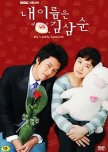
A highlight in KDrama history in terms of the processing of women´s beauty-dilemma
Admittedly, "My Name is Kim Sam-soon" is comparatively old. Here you can experience Hyun Bin very young, almost boyish in his early 20s. Nevertheless, I consider this series to be a highlight in KDrama history in terms of the thematic processing of its content. Yes, there's a lot of nagging going on in Korean style. But the arguments and what is being carried out, it has it all.It's about women's beauty ideals, especially about being slim. About last-minute panic among women over 30. About romantic ideals and the reality of relationships. About professionally successful women (and those who want to become or thus have big dreams) - not only the protagonist, but also her mother, her potential mother-in-law and the male protagonist's restaurant manager and ultimately also the male protagonist's ex.
The underlying question is whether a woman, who does not define herself by her slimness and beauty, has a chance of 'getting' a handsome, nice man. Is she even perceived as a woman? Taken seriously? From what else can a woman draw her self-esteem beyond 'beauty' to find her place in life - self-confident and happy. Is that even possible? Is attractiveness in the sense of the ideal of beauty a prerequisite for marriage, family and/or for success at work? And is all this the prerequisite for a happy life? Or maybe the question is completely wrong? Shouldn´t it not be a happy, healthy life at the beginning and then you see what else might be added to it? ...love and self-love - the thing with the chicken and the egg...
"My Name is Kim Sam-soon" tells the story about the female flaw without miraculous transformation. At the beginning (and at the end!) there is a self-confident young woman who is overweight (I would say ´normal´ (vs ´ideal´) weight, but obviously not by Korean standards). She has quirks and doubts, talents and visions, hopes and charm. She doesn't let the adverse winds in her life get her down. Her courage sometimes fails her, but she knows exactly what she wants and even better, what she doesn't want. Although her body dimensions do not meet the standards of the fashion industry - she is painfully aware of this, because that is what those around her tirelessly mirror - she does not question herself. As best as she can, she stands by herself and what she thinks is right.
Kim Sun-ah has won multiple awards for her portrayal of Kim Sam-soon. I have the greatest respect for her, because she lives her role to the fullest, just as if she were Sam-soon for real. In a world dominated by the eyes of men, she convincingly fights on behalf of several generations of women for gender-independent self-confidence, for quick-wittedness and for unconditional self love. She had put on quite a few kilos for this role in order to get away from the usual ideal of beauty. So she wins tons of hearts of women (from all over the world), for whom she carries out her inner and outer struggles on their behalf. In 2004, ratings at times reached almost 50 percent. ...The topicality of the subject has not diminished around 20 years later (one could say: "unfortunately").
The original title is: 'My name is Kim Sam-soon'. Internationally, the KDrama is marketed with the title "My Lovely Sam-soon". That's actually an insult (in my opinion). Didn't the 'decision makers' (they must have been men) actually see the series? Why do they focus the narrative perspective on the male protagonist and also emphasize his possessiveness with this possessive pronoun? And why do they only reduce Sam-soon to her appearance again? I do not get it. I assume that these ´decision makers´ probably didn´t understand anything. Even if it's possibly meant to be ironic, I consider that impossible... In any case, I choose the appropriate international title "My Name is Kim Sam-soon".
By the way, "Sam-soon" is an old-fashioned name for the third-born. It has a certain charm that this 'old-fashioned' birth name represents a bigger self-esteem problem for the female protagonist than her looks...


 9
9 39
39 15
15















